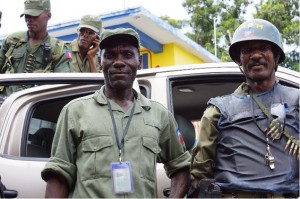Yesterday was Jean-Bertrand Aristide’s birthday and, as we’ve already blogged, there was a celebration in Haiti. Aristide himself didn’t attend, but his wife, Mildred Aristide, made a few remarks at the event.
So that lead me on a bit of a search to see if I could find some good Creative Commons images of Mildred Aristide. I still haven’t found that, but I did stumble upon some interesting quotations which are from a Democracy Now! interview with the former First Lady. At one point of the interview, she talks about the perception of dwelling on the past:
You know, when we were in Central Africa, someone gave us a book on Barthélemy Boganda, who was the founder of Central Africa, the precursor of their independence, because he ultimately — he died before Central Africa gained its independence from France. And there was a line in the book that made me freeze. When they were criticizing Boganda for being critical still of the relations between colonial France and Central Africa, and they kept telling him, “You’re talking about the past,” and that it was a new set of relations between the colonizer and the colony, and Boganda said, “I would stop talking about the past, if it weren’t so present.”
Later, she talks about the Ugandan economist and lawyer, Dani Nabudere:
Continue reading The Other Aristide


